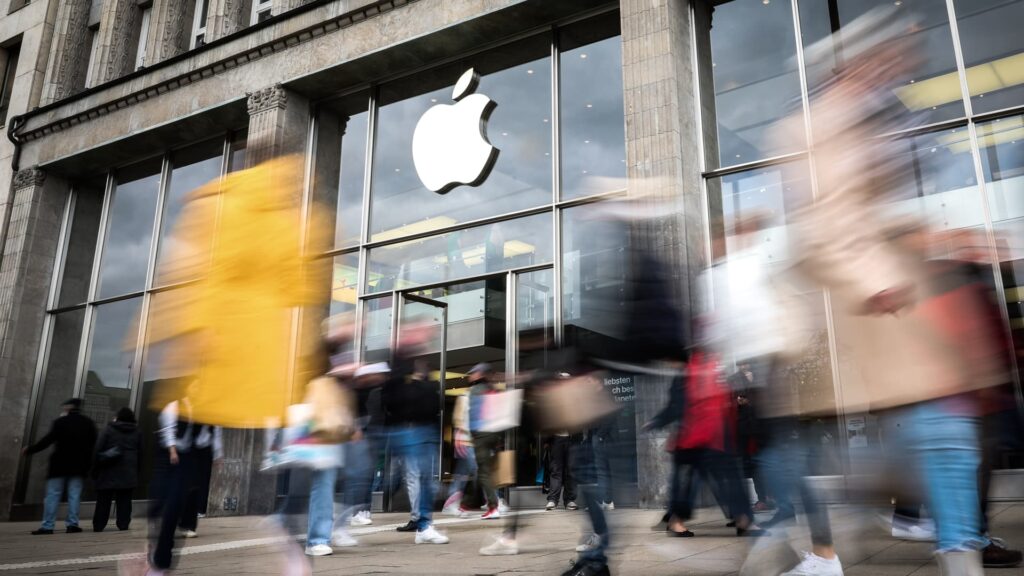
Wall Street analysts are standing by Apple in the wake of the Department of Justice’s antitrust suit against the technology behemoth. The lawsuit, filed Thursday, alleges the company established a monopoly over the smartphone market through its ecosystem. This, according to the suit, harmed consumers, developers, and competitors in the process. It also argues that Apple obstructed cross-platform messaging apps and limited third-party wallet and smartwatch compatibility to keep consumers purchasing its products. This legal battle, which targets the company’s notorious walled-garden, threatens to disrupt the technology behemoth’s business model and comes on the heels of a $2 billion fine in the European Union related to a dispute with Spotify. AAPL YTD mountain Apple shares in 2024 But Wall Street analysts are still bullish on the iPhone maker despite the potential aftershocks, with major shops such as Morgan Stanley and JPMorgan retaining their buy-equivalent ratings and highlighting upcoming potential catalysts for the company. Despite the company’s 11% year-to-date drop, about 60% of analysts hold a buy or overweight rating on the stock, with the average price target implying about 16% upside, according to FactSet. “We believe the mkt is under-appreciating AAPL’s Edge AI initiatives, and see key catalysts ahead, including [Worldwide Developers Conference] & an AI-driven iPhone upgrade cycle, which should more than offset June Q est concerns and the long-tailed DOJ lawsuit,” wrote Morgan Stanley’s Erik Woodring. The analyst reiterated his overweight rating and retained his $220 price target, adding that he sees a “positively skewed risk-reward” at these levels. The target price reflects 28% upside from Thursday’s close. Potential generative AI announcements in June can help alleviate some investor concerns and renew the recent slowdown in iPhone growth, he added. JPMorgan’s Harlan Sur also kept his overweight rating, noting that near-term investor interest will turn toward the AI-led upgrade cycle and that a low-to-mid 20s price-to-earnings multiple could lure investors back to the stock. “The DOJ lawsuit alleging monopoly practices by Apple is unlikely to be a complete surprise for investors, given the rumblings around it for quite some time now and even currently we expect most investors to treat the possibility of a material change to the financial outlook for the company as modest,” he wrote. Evercore ISI’s Amit Daryanani retained his outperform rating on the stock, calling the antitrust suit more of “headline risk than a financial risk.” He added that the firm does not anticipate any “meaningful” change in the company’s third-party app store policies unless new legislation passed in the U.S. Elsewhere, Bernstein’s Toni Sacconaghi argued that a breakup or spinout from the suit appears unlikely. Recent antitrust suit timelines also suggest that a resolution could take three to five year to attain. AAPL 1Y mountain Apple shares over the last year Sacconaghi does “not see likely remediation as materially impacting Apple financially or undermining the iPhone franchise: worst case, Apple pays a fine, and loosens restrictions for competition across the iOS platform, which we believe will have limited impact on iPhone user retention or on Services revenues.” To be sure, analysts see some potential tailwinds for payments companies and digital wallet providers should the Department of Justice win the suit. Barclays analyst Ramsey El-Assal highlighted digital payment and wallet providers such as PayPal and Block as potential winners if Apple is forced to open up its wallet. The suit currently alleges that Apple uses its monopoly to block tap-to-pay among third-party digital wallets. “We see PYPL and other digital wallet/buy-button providers as primary beneficiaries from a competitive standpoint, if the DOJ prevails,” he wrote. “However, we believe any resolution of today’s action is likely to take a meaningful amount of time.” PayPal shares are up more than 7% year to date. Square-parent Block has popped 8% in that time and 88% over the past six months.






